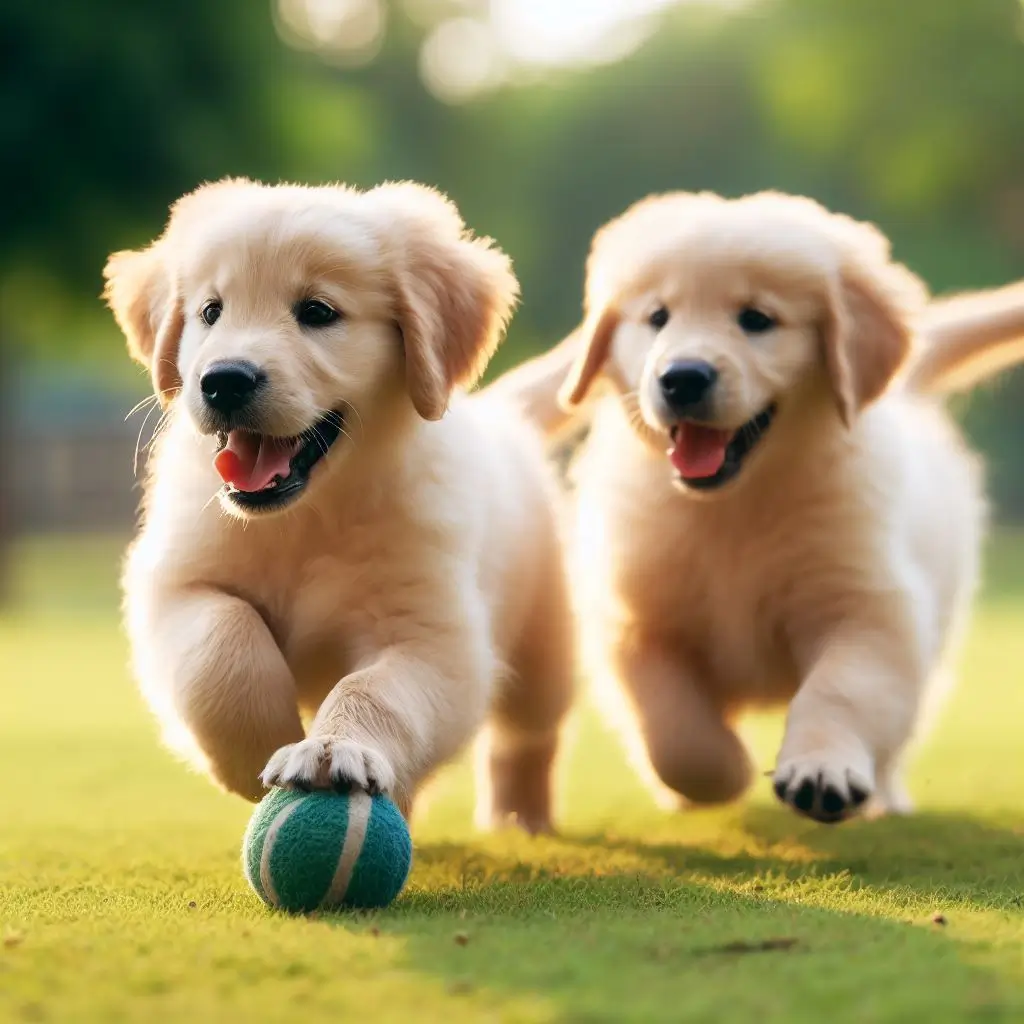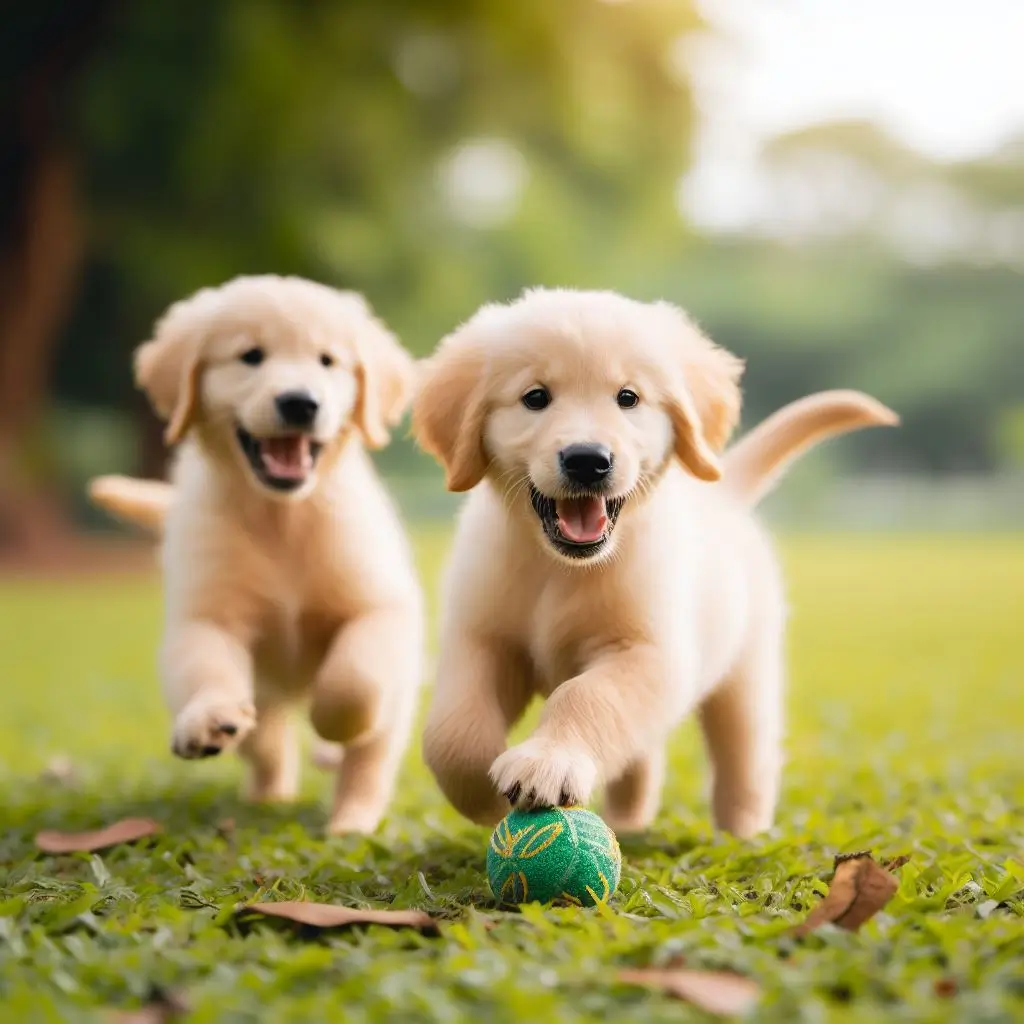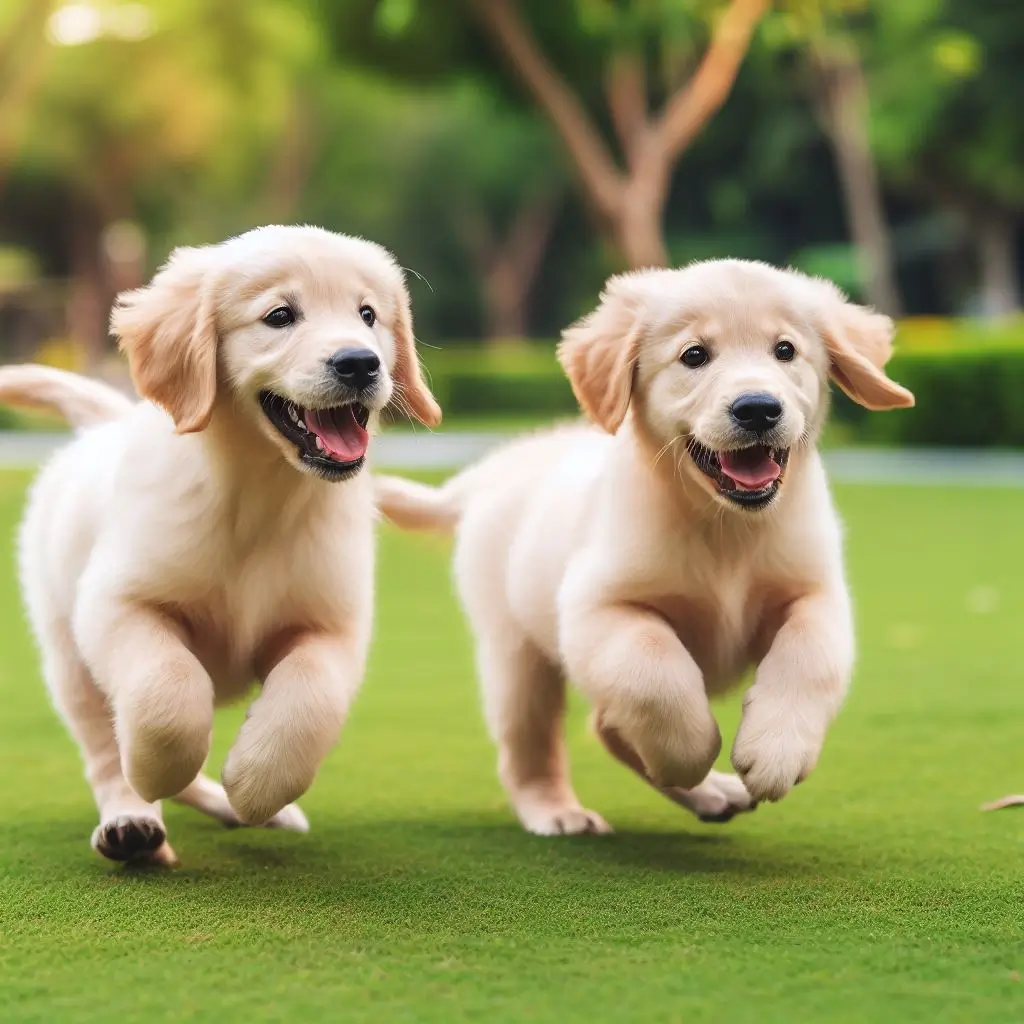Golden retriever puppies are not just pets; they’re a bundle of joy, loyalty, and boundless energy. These fluffy companions have captured the hearts of many, making them one of the most popular dog breeds worldwide. In this article, we’ll delve into the history and characteristics of these adorable pups, and why they’re so beloved.

Golden retriever puppies are the epitome of cuteness and charm. Their playful antics and affectionate nature make them a favorite among families, singles, and seniors alike. But what is it about these puppies that make them so irresistible?
- Popularity: Golden retrievers consistently rank among the top dog breeds in the world.
- Versatility: They excel in various roles, from family pets to service dogs.
- Temperament: Known for their gentle and friendly nature, they’re great with kids and other pets.
Before we dive deeper into the world of golden retriever puppies, let’s take a brief journey back in time to understand their origins.
Origins of the Golden Retriever
The golden retriever breed has a rich history that dates back to the 19th century in Scotland. They were initially bred to assist hunters in retrieving game from both water and land due to their excellent swimming ability and soft mouths.
Key Milestones in Golden Retriever History:
| Year | Event |
|---|---|
| 1860s | First golden retrievers bred by Lord Tweedmouth |
| 1911 | Recognized by the British Kennel Club |
| 1925 | Recognized by the American Kennel Club (AKC) |
| 1970s | Surge in popularity in the U.S. after Presidential pets |
Their lineage is believed to be a mix of the now-extinct Yellow Retriever, the Tweed Water Spaniel, and other breeds like the Bloodhound and Irish Setter. This mix was intended to create a breed that was excellent at retrieving and had a gentle temperament, making them perfect companions.
Characteristics of Golden Retriever Puppies

Golden retriever puppies are known for their distinctive features and endearing personalities. Let’s explore what makes them stand out:
- Physical Attributes:
- Coat: Soft, wavy to curly, and comes in various shades of gold.
- Eyes: Expressive and usually a deep brown, radiating warmth and intelligence.
- Size: As puppies, they’re small and cuddly, but they grow into medium to large-sized dogs.
- Temperament:
- Friendly: They’re sociable and get along with almost everyone.
- Intelligent: Known for their quick learning and problem-solving abilities.
- Loyal: They form strong bonds with their families and are known to be protective.
- Energy Levels:
- Golden retriever puppies are bundles of energy. They love to play, fetch, and indulge in various activities. Regular exercise and playtime are essential for their well-being.
Training Your Golden Retriever Puppy
Training is an essential aspect of raising a well-behaved and balanced dog. Given their intelligence and eagerness to please, golden retrievers are relatively easy to train.
Training Tips:
- Start Early: Begin training as soon as you bring your puppy home. Early socialization helps in shaping their behavior.
- Positive Reinforcement: Use treats, praises, and toys to reward desired behaviors. This method is effective and strengthens your bond with the puppy.
- Consistency is Key: Ensure that all family members follow the same rules and commands to avoid confusing the puppy.
- Enroll in Puppy Classes: These classes offer a structured environment for learning and socializing with other dogs.
Remember, golden retriever puppies thrive on love, patience, and consistency. With the right approach, you’ll have a loyal and well-trained companion by your side.
Health and Nutrition
Ensuring your golden retriever puppy’s health starts with the right nutrition and regular vet check-ups. Here’s what you need to know:
- Dietary Needs:
- Puppy Food: Ensure you’re feeding them high-quality puppy food that meets their nutritional requirements.
- Portion Control: Overfeeding can lead to obesity, a common issue in golden retrievers. Follow the recommended serving sizes.
- Treats: While treats are great for training, they should be given in moderation.
- Common Health Issues:
- Hip Dysplasia: A genetic condition where the thigh bone doesn’t fit into the hip joint.
- Elbow Dysplasia: Similar to hip dysplasia but affects the elbow joint.
- Eye Conditions: They can be prone to cataracts and progressive retinal atrophy.
Regular vet visits, vaccinations, and preventive care can help catch and address health issues early.
Grooming and Care
Golden retrievers have a beautiful, dense coat that requires regular grooming to keep it looking its best and to prevent matting.
Grooming Essentials:
- Brushing: With their thick double coat, golden retrievers benefit from being brushed several times a week. This not only keeps their coat looking great but also reduces shedding.
- Bathing: Depending on their activity level, a bath every month or two is sufficient. Overbathing can strip their coat of essential oils.
- Ear Cleaning: Their floppy ears can trap moisture, making them prone to infections. Regular cleaning can help prevent this.
- Nail Trimming: Long nails can be uncomfortable for them and can affect their gait. Trim their nails every few weeks.
Remember, grooming is not just about keeping your golden retriever looking good. It’s also an opportunity to check for signs of health issues like skin infections or lumps.
Activities and Playtime
Golden retriever puppies are known for their boundless energy and playful nature. Engaging them in various activities is crucial for their physical and mental well-being.
Fun Activities for Your Puppy:
- Fetch: Golden retrievers have a natural instinct to retrieve, making fetch their favorite game.
- Swimming: Most golden retrievers love water. Introduce them to swimming in a safe environment.
- Agility Training: This can be a fun way to challenge them mentally and physically.
- Hiking: As they grow older, taking them on hikes can be a great way to explore the outdoors together.
- Playdates: Organize playdates with other dogs. It’s a great way for them to socialize.
Bonding with Your Puppy
Building a strong bond with your golden retriever puppy is essential. This bond forms the foundation for training, trust, and a lifelong companionship.
Tips for Strengthening Your Bond:
- Spend Quality Time: Whether it’s playing, training, or just cuddling on the couch, spending time together strengthens your bond.
- Consistent Training: Training sessions are not just about teaching commands; they’re opportunities for mutual understanding.
- Physical Affection: Golden retrievers are affectionate dogs. Regular petting, belly rubs, and cuddles are appreciated.
- Trust Building: Always ensure your interactions are positive. Avoid punishment-based training methods.
- Adventures Together: Exploring new places and experiences together can be a bonding activity.
Remember, the bond you share with your golden retriever is special. It’s built on trust, understanding, and mutual respect.
Adoption and Buying Considerations
When deciding to bring a golden retriever puppy into your life, it’s essential to consider whether to adopt or buy. Both options have their merits.
Adoption:
- Saving a Life: By adopting, you give a dog a second chance at a loving home.
- Cost-Effective: Adoption fees are generally lower than buying from a breeder.
- Supporting Shelters: Your adoption fee helps shelters continue their mission of rescuing and rehoming animals.
Buying:
- Breed Knowledge: Reputable breeders have in-depth knowledge about the breed and can provide guidance.
- Health Screenings: Breeders often screen for common genetic health issues.
- Puppy Training: Many breeders start basic training, making the transition to your home smoother.
FAQ: Golden Retriever Puppies
- Q: How long do golden retrievers live?
- A: On average, golden retrievers live 10-12 years.
- Q: Are golden retrievers good with kids?
- A: Yes, they are known for their gentle and patient nature, making them excellent family pets.
- Q: How often should I groom my golden retriever?
- A: Regular brushing several times a week is recommended, with baths every month or two.
- Q: What health issues are common in golden retrievers?
- A: Some common issues include hip dysplasia, elbow dysplasia, and certain eye conditions.
- Q: Are golden retrievers hypoallergenic?
- A: No, they have a double coat and shed regularly, which may not be suitable for people with allergies.
Conclusion
Golden retriever puppies are a bundle of joy, love, and energy. Whether you choose to adopt or buy, the most important thing is to provide them with a loving, caring, and nurturing environment. With proper care, training, and love, you’ll have a loyal companion who will bring endless happiness to your life.
Hi, I’m John and I love dogs. Ever since I was a kid, I always wanted to have a furry friend by my side. I grew up with a golden retriever named Max, who taught me a lot about loyalty, friendship, and fun. He was my best buddy for 12 years, and I miss him every day.
